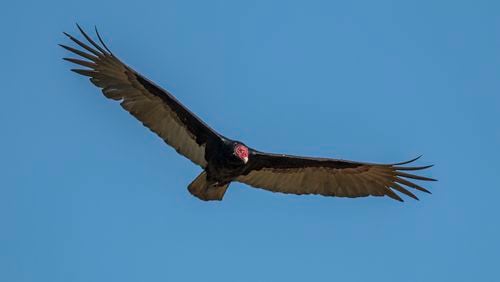My wife and I were driving on a rural road in Bibb County in Middle Georgia the other day when I spied a dark mass on the grassy roadside ahead of us. “Vultures,” I said. “Ugh,” said my wife.
I slowed down to see what they were dining on. I saw three turkey vultures and several black vultures eating what appeared to be a small, road-killed doe.
Actually, it’s not uncommon in rural Georgia to see a mixed flock of turkey vultures and black vultures eating carrion along a highway. Even so, I’m always amazed how the grotesque-looking, high-soaring birds find their prey.
Of the two species, the turkey vulture seems best equipped for detecting carrion. The bird can remain aloft for hours with barely a wing flap, taking advantage of air currents and prevailing winds to soar high overhead, always on the lookout for carcasses.
It once was believed that turkey vultures relied more on vision than smell to find dead animals. In recent decades, however, scientists have confirmed that turkey vultures have an amazing sense of smell, which may give the species the advantage in finding prey. Research shows that turkey vultures have the largest olfactory (smelling) system of all birds, giving them the ability to smell decaying flesh more than a mile away.
What the bird mostly smells is mercaptan, a foul-smelling gas emitted by rotting organisms — the same substance that’s added to odorless natural gas to detect leaks.
The black vulture, on the other hand, has little sense of smell. So how does it find food? In large part, it keeps track of turkey vultures and follows them to carcasses. But when they’re dining together, the more aggressive black vultures will try to drive away the turkey vultures and eat first.
Turkey vultures are the most widespread in Georgia, occurring throughout the state; black vultures also are wide-ranging but are less common in the mountains. Both species have completely featherless heads, but the turkey vulture’s head is red while the black vulture’s head is black.
IN THE SKY: From David Dundee, Tellus Science Museum astronomer: The moon will be a thin crescent in the west Sunday evening. Mercury, low in the west just after sunset, will appear near the moon Saturday evening. Mars and Jupiter are in the east a few hours before sunrise. Saturn rises in the east before midnight.
Charles Seabrook can be reached at [email protected].
About the Author






